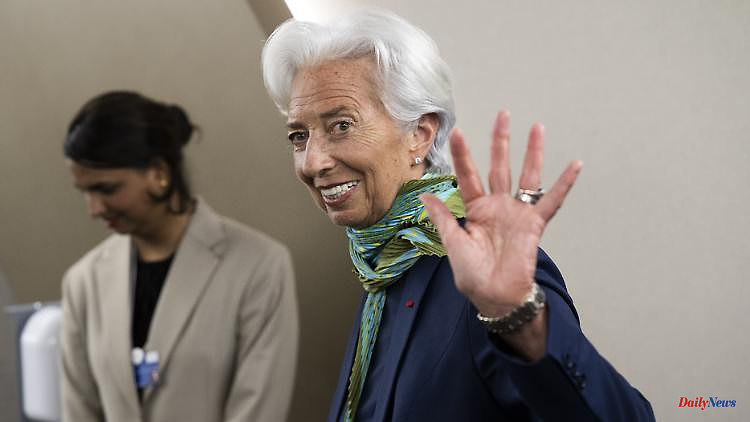In July, the ECB will raise interest rates again for the first time in eleven years. However, this does not mean an end to the high inflation. "We have to improve," says central bank chief Lagarde.
Monetary policy does not work overnight, especially not when it comes to fighting inflation. It works more from tomorrow to the day after tomorrow, the textbooks put the time lag roughly at one year. As a result, the inflation rate in the euro zone will not automatically fall from July 21 if the European Central Bank (ECB) then raises its key interest rate by 25 basis points. The central bank will therefore have to do more to get inflation under control, which recently stood at 8.1 percent in the monetary union.
ECB President Christine Lagarde made a promise in this regard on Thursday. "We will deliver," she said, referring to the ECB's inflation target of two percent. According to its own forecasts, however, the central bank will only more or less achieve this goal again in 2024. In a year or two it will be clear whether Lagarde has kept her promise. "A first important step," she said, was done - and spoke of a trip.
This time, the Governing Council of the ECB left for Amsterdam for its annual meeting outside of Frankfurt and was a guest of the Dutch central bank. A fundamental decision was made there: At the end of the month, the ECB will end its bond purchases from the APP program, which Lagarde's predecessor Mario Draghi had set up. The PEPP pandemic purchase program expired at the end of March. The ECB is thus ending the net bond purchases, which have always been controversial due to the distorting effects on the financial system. In Germany, it was also discussed whether the purchases would undermine the ban on monetary state financing.
These discussions about the unconventional monetary policy could actually be over now. With the announcement that it intends to raise key interest rates in July, the central bank is returning to traditional interest rate monetary policy. And in this respect, Lagarde surprised media representatives and markets. "Inflationary pressures have broadened," she said, then expanded on her own recent announcements in a blog post.
At that time, she had promised interest rate hikes of 25 basis points each in July and September. But now she put 50 basis points in the window for September. "Should the medium-term inflation outlook hold or deteriorate, a larger hike will be appropriate at the September meeting," the statement said. Furthermore, "Based on its current assessment, the Governing Council believes that a gradual but sustained path of further interest rate hikes will be appropriate."
But for this further path, Lagarde withdrew to the fact that this will be data-dependent. She named inflation expectations as the most important criterion and acknowledged misjudgments with regard to her own forecasts: "We have to improve." Like other central banks, the ECB was surprised by the rapid rise in prices. After the statements made during the press conference, however, the market is preparing for the big step after the summer break. "If the medium-term inflation forecasts remain unchanged or continue to rise, the key interest rates are likely to rise by more than 25 basis points in September, according to the ECB," says Jörg Kramer, chief economist at Commerzbank. "As we believe inflationary risks are likely to rise further, we now expect a 50 basis point rate hike in September."
Krämer expects the ECB to gradually raise the deposit rate to 1.5 percent by May. This is currently still minus 0.5 percent and is an important benchmark for banks and savings banks when measuring interest on bank deposits. There are therefore signs of a significant increase in savings interest rates in the coming months. The actual key interest rate of the euro zone, the main refinancing rate, is currently zero percent and could then rise towards two percent. Then it would also be time to check if Lagarde has kept her promise.
However, the near end of bond purchases is also worrying market players, especially with regard to highly indebted Italy. It is no wonder that market interest rates rose significantly after Lagarde's September surprise. But the extent in the euro zone was different. At 1.43 percent, the yield on the ten-year Bund reached a level that not too long ago would have offset inflation. The daily gain was eight basis points, according to Bloomberg data. In contrast, the yield on Italian government bonds rose by 19 basis points to 3.35 percent. All this is not dramatic, but a possible fragmentation of the financial markets worries the ECB. It can then no longer effectively enforce its monetary policy.
Lagarde appeared to be aware of this issue and showed the market the €1.7 trillion bazooka during the press conference. For so much money, the ECB bought bonds from the market under PEPP and wants to reinvest repayments until further notice. Lagarde emphasized flexibility in reinvesting in jurisdictions and maturities. In other words: Expiring Bunds could be replaced by long-dated Italian bonds. "The flexibility built into the PEPP reinvestment program appears, at least for now, to be the only way to mitigate the risks of fragmentation," said Dave Chappell, fixed income fund manager at Columbia Threadneedle.
However, Lagarde apparently has other ideas about the PEPP treasure on the balance sheet. In a side note, she announced that she would consider reinvesting PEPP funds and "green" refinancing offers for banks (TLTRO) in the coming months. A "Green TLRTO" could be the ECB's next big thing after the rate hike. But even that would only have a very long-term effect.
This text first appeared on "Capital".












